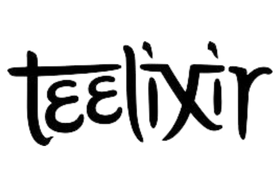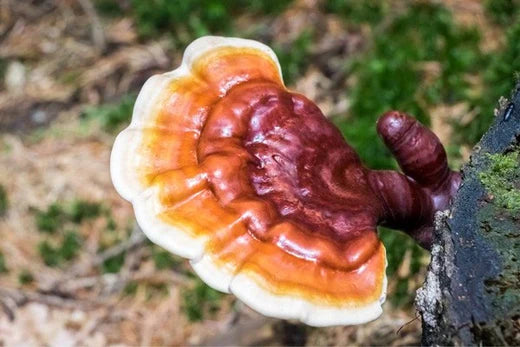Reishi Mushroom Benefits: 12 Science-Backed Reasons to Try the Queen of Mushrooms
Reishi mushroom (Ganoderma lucidum) is one of the most researched medicinal mushrooms on Earth. Revered in Traditional Chinese Medicine (TCM) for over 2,000 years, reishi earned the title "Mushroom of Immortality" and is often called the Queen of Mushrooms for its extraordinary breadth of traditional uses. From immune defence to deep, restorative sleep, the benefits of reishi span almost every major body system.
Below we explore 12 evidence-based reasons to make reishi part of your daily ritual, plus practical guidance on dosage, side effects, and what to look for in a quality supplement.
What Is Reishi Mushroom?
Reishi (Ganoderma lucidum), known as Ling Zhi in Chinese and Mannentake in Japanese, is a woody bracket fungus that grows on hardwood trees in humid, temperate forests across Asia. In the classical Chinese pharmacopoeia, it was ranked among the "superior" herbs — substances safe for long-term, daily use that promote overall vitality rather than treating a single ailment.
The fruiting body contains over 400 bioactive compounds. The most studied are beta-glucan polysaccharides, which modulate immune cell activity, and ganoderic acids (a class of triterpenes) responsible for many of reishi's adaptogenic and liver-supportive properties. To unlock both water-soluble polysaccharides and alcohol-soluble triterpenes, high-quality reishi products use dual extraction (hot water + alcohol), delivering the full spectrum of compounds in a single dose.
12 Evidence-Based Reishi Mushroom Benefits
1. Immune System Support
Reishi is best known for its profound effect on immune function. Its beta-glucan polysaccharides bind to receptors on macrophages, dendritic cells, and natural killer (NK) cells, helping to modulate the immune response rather than simply stimulate it. That means reishi may support an under-active immune system while helping to calm an overactive one. A comprehensive review in Herbal Medicine: Biomolecular and Clinical Aspects (Wachtel-Galor et al., 2011) concluded that reishi polysaccharides demonstrate significant immunomodulatory activity across multiple pathways, making it one of the most studied natural immune tonics available.
2. Stress and Anxiety Relief
Classified as a true adaptogen, reishi helps the body resist and recover from physical, chemical, and emotional stressors. In TCM, reishi is prized for calming the Shen (spirit or mind), a concept roughly equivalent to emotional equilibrium. Practitioners have traditionally recommended it for restlessness, irritability, and overthinking. The triterpene compounds, particularly ganoderic acids A and B, are thought to interact with pathways involved in the stress response, supporting a calm, centred state without sedation during the day. For anyone navigating a demanding work schedule or life transition, reishi offers gentle, non-stimulating nervous system support.
3. Sleep Quality
One of the most popular traditional uses of reishi is as a sleep tonic. Unlike pharmaceutical sleep aids, reishi does not force drowsiness. Instead, its triterpene compounds may support healthy GABA receptor activity — the same calming neurotransmitter system targeted by many relaxation supplements. Over days and weeks of consistent use, many people report falling asleep more easily, staying asleep longer, and waking feeling more refreshed. TCM practitioners often recommend taking reishi in the evening, mixed into warm water, herbal tea, or a cacao elixir, to gently wind down the nervous system before bed.
4. Liver Support
The liver is the body's master detoxification organ, and reishi has been traditionally used for centuries to support its function. Ganoderic acids demonstrate hepatoprotective properties in laboratory studies, meaning they may help shield liver cells from oxidative damage. In TCM, reishi is associated with smooth "Liver Qi" flow — a concept linked to emotional balance, healthy digestion, and clear eyes. Modern research has focused on reishi's ability to support the body's natural Phase I and Phase II detoxification pathways, making it a popular choice for seasonal cleansing protocols and everyday liver wellness.
5. Heart and Cardiovascular Health
Reishi has been traditionally used to support a healthy cardiovascular system. Its triterpenes may help maintain blood pressure already within the normal range, while polysaccharides have been studied for their potential role in supporting healthy cholesterol metabolism. Additionally, reishi's antioxidant compounds may help protect blood vessel walls from oxidative stress. In TCM, reishi is considered a heart Shen tonic, nourishing the heart organ system responsible for circulation, consciousness, and emotional warmth. Consistent use over time is traditionally recommended for cumulative cardiovascular support.
6. Anti-Ageing and Longevity
The name "Mushroom of Immortality" was not given lightly. Reishi is rich in antioxidant compounds that may support the body's natural defences against oxidative stress — one of the primary drivers of cellular ageing. Specific compounds in reishi have been shown to support superoxide dismutase (SOD) and catalase activity, two of the body's own master antioxidant enzymes. Polysaccharides in the fruiting body also support healthy cell renewal processes. In Taoist tradition, daily reishi consumption was considered essential for spiritual cultivation and physical preservation, a practice that modern longevity research is beginning to validate at the molecular level.
7. Respiratory Health
In TCM, reishi is classified as a Lung Qi tonic, traditionally used to strengthen the respiratory system and support deep, easeful breathing. It has been recommended for centuries for people with weak constitutions, frequent seasonal challenges, or general respiratory sensitivity. The polysaccharide and triterpene compounds in reishi may help maintain healthy mucous membrane function and support the body's natural respiratory defence mechanisms. This makes reishi a popular choice during the colder months, often combined with astragalus or cordyceps for comprehensive respiratory support.
8. Gut Health
Emerging research highlights reishi's role as a prebiotic. Its polysaccharides are not fully digested in the upper GI tract, meaning they reach the large intestine where they serve as fuel for beneficial gut bacteria, including Bifidobacterium and Lactobacillus species. A healthy, diverse gut microbiome is increasingly linked to immune function, mood regulation, and metabolic health. Traditionally, reishi was used to support smooth digestion and relieve occasional bloating. The combination of prebiotic fibre, anti-inflammatory triterpenes, and immune-modulating beta-glucans makes reishi a multi-action gut support tonic.
9. Skin Health
Healthy skin starts from within, and reishi's potent antioxidant profile may support a clear, vibrant complexion. Beta-glucans are known for their ability to deeply hydrate skin tissue from the inside out, while triterpenes may help calm inflammatory skin responses. Reishi's support for liver detoxification and gut health also contributes to skin clarity, since both organs play key roles in eliminating toxins that can manifest as blemishes, dullness, or sensitivity. In traditional Taoist beauty practices, reishi was consumed daily by royalty seeking to preserve youthful skin. Today, it is a staple ingredient in both ingestible and topical beauty formulations.
10. Energy and Vitality (Without Stimulants)
Unlike caffeine or other stimulants, reishi supports energy at the foundational level by nourishing the adrenal glands and supporting mitochondrial function. In TCM, chronic fatigue and low vitality are often attributed to depleted Qi and Jing (essence), and reishi is one of the few herbs traditionally said to nourish both. Users typically report not a sudden burst of energy but rather a gradual lifting of persistent tiredness over one to four weeks of consistent use. This makes reishi ideal for people recovering from burnout, illness, or prolonged stress who need sustainable energy restoration rather than a quick fix.
11. Hormonal Balance
Reishi has been traditionally used as a hormone-balancing tonic, particularly for supporting healthy endocrine function in both men and women. Its adaptogenic properties may help the hypothalamic-pituitary-adrenal (HPA) axis respond more efficiently to stress, which in turn supports balanced cortisol, thyroid, and reproductive hormone levels. In TCM, reishi is often included in formulas for women experiencing hormonal transitions, and for men seeking to maintain vitality and resilience. The triterpene compounds in reishi have also been studied for their potential role in supporting healthy inflammatory responses within the endocrine system.
12. Cognitive Function
Reishi contains compounds with neuroprotective potential, including specific triterpenes that may cross the blood-brain barrier. Traditional practitioners used reishi to support mental clarity, focus, and emotional stability — all aspects of Shen cultivation. Modern research has explored reishi's ability to support nerve growth factor (NGF) production and protect neural tissue from oxidative damage. While lion's mane is more commonly associated with cognition, reishi offers complementary support by calming mental noise, improving sleep quality, and reducing the cognitive burden of chronic stress.
How to Take Reishi Mushroom
For best results, take 1/2 teaspoon (approximately 1–2 grams) of dual-extracted reishi powder daily. Reishi has a naturally bitter, earthy flavour that pairs well with:
- Hot water or herbal tea — the simplest and most traditional method
- Coffee — reishi smooths out caffeine jitters while adding adaptogenic support
- Cacao or hot chocolate — the bitterness blends beautifully with raw cacao
- Smoothies — add to your morning blend with banana, nut butter, and plant milk
Best time to take reishi: Evening is ideal, thanks to its calming, sleep-supportive properties. However, reishi is non-stimulating, so it can be taken at any time of day without disrupting your energy or focus.
Tip: Start with a smaller dose (1/4 teaspoon) for the first few days and gradually increase. Consistency matters more than dose — daily use over 4–8 weeks is when most people notice cumulative benefits.
Reishi Mushroom Side Effects
Reishi is generally well-tolerated and has been consumed safely for thousands of years. However, some people may experience:
- Mild digestive upset during the first few days, especially at higher doses. This typically resolves as the body adjusts.
- Dry mouth or throat in rare cases. Increase water intake if this occurs.
Consult your healthcare professional before taking reishi if you:
- Are taking blood-thinning medications (reishi may have mild antiplatelet activity)
- Are on immunosuppressant drugs (reishi modulates immune function)
- Are pregnant or breastfeeding
- Have a scheduled surgery within two weeks (discontinue use as a precaution)
What to Look for in a Reishi Supplement
Not all reishi supplements are created equal. The difference between a premium product and a low-grade one can be enormous. Here is what to look for:
- Certified organic — ensures no pesticides, heavy metals, or chemical residues
- Dual-extracted (hot water + alcohol) — delivers both water-soluble beta-glucans and alcohol-soluble triterpenes for full-spectrum benefits
- Di Tao sourced — grown in its traditional, authentic growing region (for reishi, this means the Changbai Mountain region or Wuyi Mountains of China, where wild reishi has grown for millennia)
- 100% fruiting body — avoid products made from mycelium grown on grain, which contain high levels of starch filler and lower concentrations of active compounds
- Third-party lab tested — independently verified for beta-glucan content, heavy metals, and microbial safety
Shop Teelixir Reishi Mushroom
At Teelixir, our Organic Reishi Mushroom 10:1 Extract Powder is dual-extracted, Di Tao sourced, certified organic, and made from 100% fruiting body — no fillers, grains, or mycelium on grain. Every batch is third-party lab tested for potency and purity.
We also offer Pure Organic Whole Food Reishi (1:1) for those who prefer a gentler, whole-food preparation.
Looking for a multi-mushroom formula? Our Organic Mushroom Immunity Complex combines reishi with lion's mane, cordyceps, chaga, maitake, and shiitake for comprehensive daily support.
Free shipping Australia-wide on orders over $99.
Frequently Asked Questions
What does reishi mushroom do?
Reishi is an adaptogenic mushroom traditionally used for immune support, stress relief, better sleep, and longevity. It contains over 400 bioactive compounds including beta-glucan polysaccharides, ganoderic acids, and triterpenes that work across multiple body systems. It is one of the few herbs in TCM said to nourish Jing (essence), Qi (energy), and Shen (spirit) simultaneously.
Is reishi safe to take daily?
Yes. Reishi has been consumed daily for thousands of years in Traditional Chinese Medicine and is classified as a "superior" herb, meaning it is considered safe for long-term use. Start with 1/2 teaspoon (1–2g) per day and consult your healthcare professional if you are taking medications or have a pre-existing condition.
When is the best time to take reishi?
Evening is ideal due to reishi's calming, sleep-supportive properties. However, it is non-stimulating, so it can be taken at any time of day. Many people enjoy it as part of an evening wind-down ritual in warm water, herbal tea, or cacao.
Can I take reishi with other mushrooms?
Absolutely. Reishi pairs well with lion's mane (for cognition and nerve support), cordyceps (for energy and athletic performance), and chaga (for antioxidants). Our Mushroom Immunity Complex combines six medicinal mushrooms for a balanced daily blend.
How long does reishi take to work?
Many people notice calming effects and improved sleep quality within the first week. For deeper benefits like immune modulation, hormonal balance, and sustained energy, consistent daily use for 4–8 weeks is traditionally recommended. Reishi is a tonic herb — its benefits build over time with regular use.
What is the difference between reishi and chaga?
Both are powerful medicinal mushrooms, but they have different strengths. Reishi is best known for calming the nervous system, supporting sleep, and modulating immunity, while chaga is prized for its exceptionally high antioxidant content and digestive support. They complement each other well. Read our detailed comparison: Chaga vs Reishi: Key Differences and How to Choose.
Disclaimer: The information provided is for educational purposes only and is not intended as medical advice. These statements have not been evaluated by the TGA. This product is not intended to diagnose, treat, cure, or prevent any disease. Consult your healthcare professional before starting any supplement.





